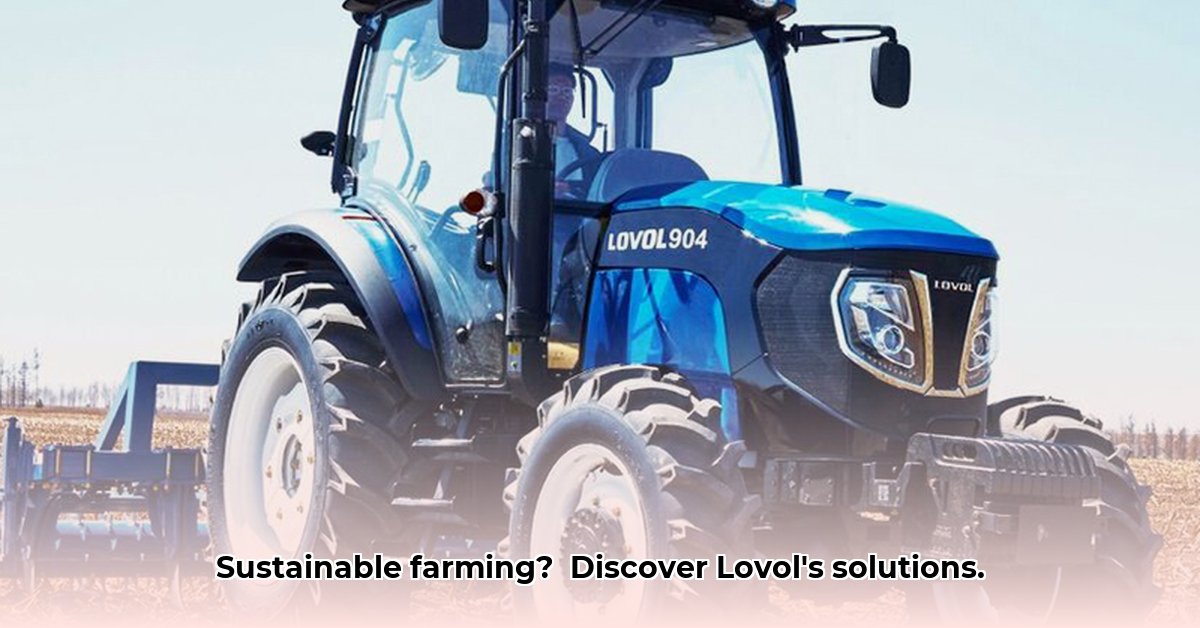
Lovol tractors are a significant player in the global agricultural machinery market, boasting a wide distribution network and established customer base. However, their contribution to sustainable agriculture remains unclear due to a lack of transparency regarding key sustainability metrics. While their market presence is undeniable, a closer examination reveals a significant gap in publicly available data regarding their environmental performance.
Lovol's Global Reach: A Major Player
Lovol tractors are sold and serviced across numerous countries, demonstrating a substantial market share in the agricultural machinery sector. This broad reach indicates a significant influence on farming practices worldwide. However, market dominance doesn't automatically equate to environmental responsibility. The question remains: How does Lovol's operational footprint align with the growing demand for sustainable agriculture? Does their impressive global reach translate to environmentally conscious practices?
The Sustainability Data Deficit: A Transparency Gap
A critical weakness in assessing Lovol's commitment to sustainability is the scarcity of publicly available data on key performance indicators. Information regarding fuel efficiency, greenhouse gas emissions, and the overall lifecycle environmental impact of their tractors is notably lacking. This opacity contrasts sharply with competitors who transparently report on their Environmental, Social, and Governance (ESG) performance. This lack of transparency from Lovol raises concerns about their commitment to sustainable agriculture. What accounts for this information gap? Is it an intentional omission, or a simple oversight?
Comparing Lovol to Competitors: A Difficult Task
Direct comparison of Lovol's sustainability performance with that of competitors proves challenging due to this significant data deficit. Many competitors openly publish detailed ESG reports, providing benchmarks for evaluating their environmental impact. Without equivalent data from Lovol, a meaningful comparison remains impossible. This lack of information hinders efforts to assess Lovol's true contribution to a sustainable agricultural landscape. How can consumers, farmers, and policymakers make informed decisions without comprehensive data?
The Potential for Green: Untapped Opportunities
Lovol tractors possess the potential to contribute significantly to sustainable farming practices. The integration of precision farming technologies – such as GPS-guided equipment and variable-rate application of fertilizers and pesticides – could drastically reduce fuel consumption, chemical usage, and environmental impact. However, the lack of concrete evidence of Lovol actively pursuing and implementing these technologies hinders a full assessment of their potential. What specific initiatives is Lovol undertaking to improve its tractors' environmental footprint?
A Collaborative Path Forward: Steps to Enhance Sustainability
Addressing Lovol's sustainability challenges requires a multi-stakeholder approach:
Lovol's Responsibility: Conduct thorough lifecycle assessments (LCAs) (comprehensive analyses of environmental impacts from production to disposal) of their entire tractor line. Publish detailed and verifiable sustainability reports, including fuel efficiency, emission rates, and material sourcing data to demonstrate transparency.
Investor and Analyst Engagement: Investors and financial analysts should prioritize sustainability performance in their evaluations of Lovol and other agricultural machinery companies. Integrating ESG factors into investment decisions will incentivize greater transparency.
Farmer Advocacy: Farmers should actively seek out and demand transparent information on the environmental performance of the agricultural machinery they purchase. By demanding sustainability data, farmers can drive market changes.
Regulatory Action: Governments should implement and enforce stricter regulations regarding sustainability reporting and emission standards for agricultural equipment. This creates a level playing field and incentivizes environmentally responsible practices.
Navigating the Regulatory Landscape: Mitigating Future Risks
Lovol's current lack of transparency increases its vulnerability to future environmental regulations. Proactive compliance with current and anticipated regulations is essential to mitigate potential risks, including financial penalties and reputational damage. A proactive approach presents a strategic advantage, safeguarding both the company's financial future and its contribution to sustainability.
Conclusion: Transparency is Key
Lovol's market success is undeniable, but its contribution to sustainable agriculture requires substantial improvement in transparency. The company must prioritize the publication of comprehensive sustainability data to allow for objective evaluation of its environmental performance. A collaborative effort involving Lovol, investors, farmers, and regulators is crucial to ensure the agricultural sector's transition towards sustainable practices. The lack of transparency not only hampers informed decision-making but also presents significant risks to Lovol in a rapidly changing regulatory landscape. Action, not just words, is needed to build a sustainable agricultural future.